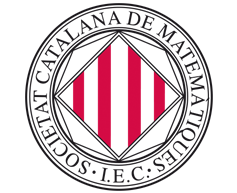Organisers: Xavier Guitart (UB) and Carlos de Vera (UPM)
Friday Oct 23, 10:30 – 12:40, Zoom room Pere Coromines
10:30 – 11:10 – Yukako Kezuka (Universität Regensburg)
The Birch–Swinnerton-Dyer conjecture is one of the most celebrated open problems in number theory. In this talk, I will study this conjecture for elliptic curves E of the form x^3+y^3=N for positive integers N. They are twists of the Fermat elliptic curve x^3+y^3=1, and admit complex multiplication by the ring of integers of ℚ(√(-3)). First, I will explain the Tamagawa number divisibility satisfied by the central L-values, and exhibit a curious relation between the 3-part of the Tate–Shafarevich group of E and the number of prime divisors of N which are inert in ℚ(√(-3)). I will then explain my joint work with Yongxiong Li, studying in more detail the cases when N=2p or 2p^2 for an odd prime number p congruent to 2 or 5 modulo 9. The corresponding curves have rank 0 or 1 by the works of Satgé, Cai, Shu and Tian. For these curves, we establish the 3-part of the Birch-Swinnerton-Dyer conjecture and a relation between the ideal class group of ℚ(√(p)) and the 2-Selmer group of E, which can be used to study non-triviality of the 2-part of the Tate–Shafarevich group.
11:15 – 11:55 – Pierre Charollois (Institut de Mathématiques de Jussieu)
I will first recall a joint work with Dasgupta and Greenberg (2016), where we elaborate on Shintani’s method to construct an Eisenstein cocycle over GLN(Z) taking values in a ring of rational generating series that can be expressed in terms of basic trigonometric functions. Combined with evaluation on a tori in GLN, it allows us to recover the basic properties of the Cassou-Noguès p-adic zeta functions attached to totally real fields. Then I’ll give an overview of the elliptic generalization I have later obtained, where trigonometric functions are now replaced by the Kronecker-Eisenstein function, which is a generating series for modular forms. The action of Hecke operators over GLN on that new cocycle has been studied by Hao Zhang in his thesis (2020), and the end of talk will present some of his results too.
12:00 – 12:40 – Paloma Bengoechea (ETH Zürich)
Let F(x,y) be a binary form with integer coefficients, degree at least 3 and irreducible over the rationals. Since Thue showed that the equations F(x,y)=m and inequalities |F(x,y)|<m, for a positive integer m, have finitely many integer solutions (x,y), there is a whole history of works giving upper bounds for the number of such solutions. We will give some new upper bounds that prove a conjecture by Mueller and Schmidt (1988) for almost all binary forms. We will also discuss a recent result by Bhargava and Akhtari showing that a positive proportion of Thue equations with fixed degree fail the integral Hasse principle when ordered by the absolute value of the maximum of the coefficients, and how it can be modified to obtain Thue equations failing the integral Hasse principle simultaneously for every positive integer h less than m.
Saturday Oct 24, 15:00 – 17:10, Zoom room Pere Coromines
15:00 – 15:40 – Sara Arias-de-Reyna (Universidad de Sevilla)
In this talk we want to show an application of the theory of field arithmetic to the existence of non-liftable weight one Katz modular eigenforms in characteristic p, where p is a (very) small prime. The link between these two subjects is the Galois representation attached to such a modular form. This is joint work with F. Legrand and G. Wiese.
15:45 – 16:25 – Antonio Cauchi (Univ. Politècnica de Catalunya)
In this talk, we will report some progress towards the Beilinson conjectures for Siegel Shimura varieties. We will explain how to construct classes in the cohomology of the Siegel Shimura variety of almost any dimension and how to compute their image by Beilinson’s higher regulator in terms of Rankin-Selberg type automorphic integrals. In the case of the Siegel sixfold, using results of Pollack and Shah, we relate the integral to a non-critical special value of a degree 8 spin L-function. If time permits, we will give an application to Iwasawa theory. This is joint work with Francesco Lemma and Joaquin Rodrigues Jacinto.
16:30 – 17:10 – Francesc Fité (Massachusetts Institute of Technology)
The Sato-Tate group of an abelian variety A of dimension g defined over a number field is a compact real Lie subgroup of the unitary symplectic group of degree 2g that conjecturally governs the limiting distribution of the normalized Frobenius elements acting on the Tate module of A. In previous joint work with Kedlaya, Rotger and Sutherland, it was shown that there are 52 such subgroups (up to conjugacy) that occur as Sato-Tate groups of abelian surfaces over number fields. In this talk I will discuss the classification of the 410 subgroups (up to conjugacy) of the unitary symplectic group of degree 6 that occur as Sato-Tate groups of abelian threefolds over number fields. This is a joint work with Kiran Kedlaya and Andrew Sutherland.
